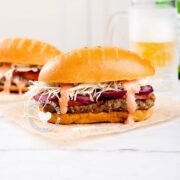It may seem daunting at first, but it is possible to survive vegetarianism in the Dominican Republic. Let us tell you how.

First of all, what sort of vegetarian are you? What the airlines describe as 'lacto'? 'Lacto-ovo'? These curious categories have long been obsolete everywhere except airline ticketing codes. They mean vegetarians who eat dairy products and vegetarians who eat dairy products and eggs. Are you a fishetarian? That means a vegetarian who eats seafood (my definition). Disapproving purist veggies may label you a pescivore, though. Are you a vegan? Vegans are vegetarians who do not eat anything of animal origin, including dairy and eggs, and in some cases even honey.
When I first arrived in the Dominican Republic I soon realized that as a lacto-ovo vegetarian with pescivore tendencies I would have no problem adapting to the local cuisine. I have been to very few countries where it was difficult to avoid eating meat, and in my experience the problem is usually more to do with communication and the language barrier. If you can explain them in a respectful and considerate way, people are always willing to do their best to accommodate your needs, within limitations.

DR dwellers are at an advantage compared to the visitor. If you're doing your own cooking you'll have at your disposal all the right ingredients for making Dominican and international food to your particular specifications. If you're a tourist eating out at restaurants you'll have to allow for some flexibility. The small, family-run, typical Dominican restaurants will offer la bandera and a limited selection of other traditional recipes. In the capital and larger cities there are international restaurants which offer specific vegetarian options and even some specialist vegetarian establishments. The same goes for the tourist areas. In rural, non-tourist areas you will face more of a challenge.
La Bandera - white rice, bean stew, salad and meat - as we all know is the daily lunchtime meal for most Dominicans. It can be a tasty, well-balanced vegetarian meal for all types of vegetarians - including vegans - when you leave out the meat/chicken component. Most restaurants and households all over the country serve each component separately in small bowls so there is no 'cross-contamination' risk for the more squeamish amongst you. The only caution is that the bean stew is often made with a chicken stock cube. The same goes for delicious rice and bean/pigeon pea concoctions called moro. If you are able to make allowances this should not be a problem. If you are very strict and the circumstances are right, could speak to the cook beforehand and ask that the offending item be left out of the preparation!

In some cases, you may also be able to ask them to prepare a special alternative dish for you, taking into account the ingredients likely to be at their disposal - Toasted cheese sandwich and salad? White rice and boiled vegetables? Fried egg and chips (potato, yuca or plantain)? Spaghetti with tomato sauce? Pan con aguacate? This is where reasonably good language and communication skills come in. Another plus to consider in the Dominican Republic is that the oil used is always vegetable oil as opposed to lard which in my experience is more common on mainland Latin America.
Dominicans enjoy a reasonable variety of dishes and snacks which are meat-free - typical mangus (mashed plantain, yuca, yautia or batata), filling pastelones (casseroles), tasty cheese empanadas (pasties), fresh salads, and wonderful soups such as crema de auyama (cream of pumpkin). Our site offers a guide to which Dominican recipes are suitable or not for vegetarians.
If you are a fishetarian - or pescivore - your options increase. In coastal areas and beyond seafood of many types is popular and easily available. The fish/prawn/crab in coconut sauce typical of the Samana region is especially recommended. Conch stew - lambi guisado - is my personal favorite. Asopao de camarones and seafood paellas are also a good choice.

Sancocho is the main Dominican dish that we vegetarians will have to do without. It is a heavily meat-based stew, impossible to adapt to carnophobe tastes.
I would advise people to do their best to sample as much as possible of the local cuisine as your conscience allows, because Dominicans are very proud of it, and you would be missing out on a major part of the Dominican experience if you insist on always sticking to the safe options.
Any by the way, the adjective "vegano" refers to the city of La Vega. It is not a dietary option.
Check our vegan recipes and vegetarian (ovo-lacto) recipes





